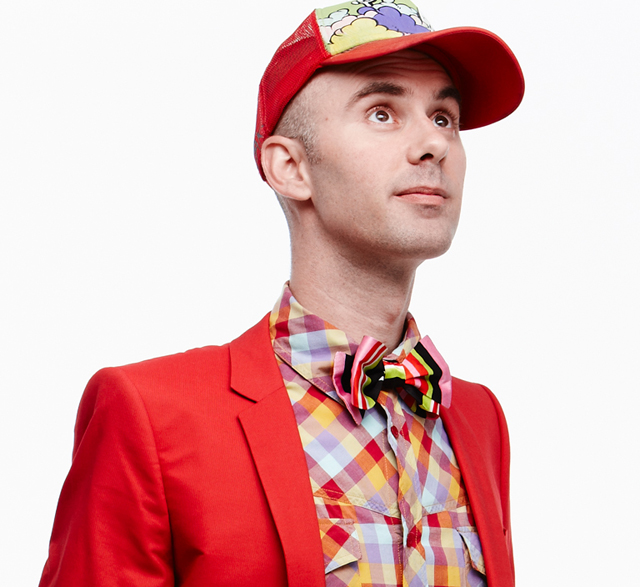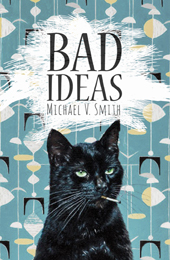
The author of several books including What You Can’t Have and My Body Is Yours, Michael V. Smith is also the winner of the inaugural Dayne Ogilvie Prize for LGBT Emerging Writers, and was nominated for the Journey Prize. Smith currently teaches creative writing at the University of British Columbia’s Okanagan campus in Kelowna, British Columbia, and his latest poetry collection, Bad Ideas, has just been released by Nightwood Editions. He answers a few questions from Nathaniel G. Moore below.
This is your first book of poetry in a while. What was it like to return to poetry after your recent bout of nonfiction?
Related Posts
 I’m always tinkering with poetry. My books tend to overlap one with the other; so much of this book was written while I was working on nonfiction. One of the joys in poetry is that you get a fast hit, you know? You slog away on a book of long-form prose, but with poetry you can dip into a poem, finish it, and feel that thrill of finishing something. Working on multiple books in tandem is a great way to accumulate poems, to get a greater breadth out of your writing — because the poem informs the prose and vice versa — while still feeling like you’re accomplishing something. And the container of the poem is so lovely. You can hold a poem in the palm of your hand, to see the universe revolving in it. So I’m always holding poetry close.
I’m always tinkering with poetry. My books tend to overlap one with the other; so much of this book was written while I was working on nonfiction. One of the joys in poetry is that you get a fast hit, you know? You slog away on a book of long-form prose, but with poetry you can dip into a poem, finish it, and feel that thrill of finishing something. Working on multiple books in tandem is a great way to accumulate poems, to get a greater breadth out of your writing — because the poem informs the prose and vice versa — while still feeling like you’re accomplishing something. And the container of the poem is so lovely. You can hold a poem in the palm of your hand, to see the universe revolving in it. So I’m always holding poetry close.
Many of these poems appeared in literary journals before making their way into Bad Ideas. How important are literary magazines in the process of putting together a poetry manuscript?
The poem is hard to see until it’s in print somewhere, beside other works. Like, a poem on a page, or in the company of your own poems, is a lonely thing. It’s siloed. Lit mags are a terrific way to see how your poem measures up, to get a sense of what it does, compared to its friends. A poem needs the company of other poems not related to them, so it can know what it is.
What are you most looking forward to about releasing Bad Ideas?
I’m most looking forward to touring with a bunch of great writers: Pierre-Luc Landry, Tara-Michelle Ziniuk, Marcus McCann, and Daniel Zomparelli. We’re all doing this big tour in Ottawa, Toronto, and Montreal together, and maybe some other parts. Queer poets will be on the loose!
Possibly a related question here, what can people look forward to for your book tour and promotional plans for Bad Ideas?
We’re doing a tour in a strip club in Montreal. That’s always a good time stage, at the Violet Hour, thanks to the host and organizer Christopher DiRaddo. I like to do some audience participation stuff in my book launches, so I’m going to be performing the poems with, um, a unique approach. I don’t want to spoil the full surprise, but I’m giving personal readings.
The last poem in the book deals with family, memory and love. You write “Some truths are so cutting/we need a story”. Do you feel that as a writer, you need a bit of truth to cling to? As a source for writing a piece of fiction or nonfiction or a poem, does the truth help at all?
We’re in weird times with the truth, aren’t we? With post-truth journalism and politicians here and south of the border reveling in their own lies, it’s hard to talk about truth with any conviction. I definitely draw a lot of material from my own experience. But much of this book arrived in the dreams of my friends and family, which they recorded and shared with me. Are dreams true? The fact of the dream exists, but does that mean the dream is fact? I teach my students that even the things we make up can be full of truth, but we complicate what it means to say a thing is true or not true. I don’t know, I’m just making a tangle of ideas here, aren’t I?
Let me say this: every poem is true to the writer and only true if it’s true for the reader too. Poems act like test cases, to determine what we both agree to be true.